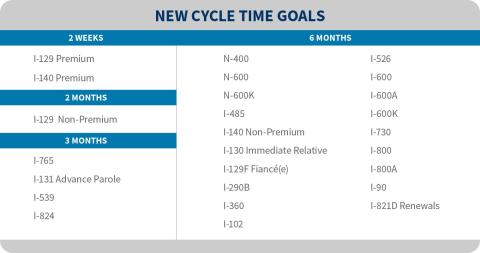Wednesday, March 30, 2022 - Yesterday, U.S. Citizenship and Immigrations Services (USCIS) announced a trio of efforts to increase efficiency and reduce burdens to the overall legal immigration system. USCIS will begin setting new agency-wide backlog reduction goals, expand premium processing to additional form types, and work to improve timely access to employment authorization documents. Due to the COVID-19 pandemic and resource constraints resulting from the prior administration, USCIS inherited a significant number of pending cases and increased processing times. Through yesterday's actions by the Biden administration, USCIS is acting to reduce these caseloads and processing times, while also ensuring that fair and efficient services are available to applicants and petitioners.
Reducing Processing Backlogs:
To reduce the agency’s pending caseload, USCIS is establishing new internal cycle time goals this month. These goals are internal metrics that guide the backlog reduction efforts of the USCIS workforce and affect how long it takes the agency to process cases. As cycle times improve, processing times will follow, and applicants and petitioners will receive decisions on their cases more quickly. USCIS will be increase capacity, improve technology, and expand staffing to achieve these new goals by the end of FY 2023. As part of their backlog reduction efforts, USCIS has shared the below new cycle time goals to achieve by the end of fiscal year 2023.

Improving Access to Employment Authorization Documents:
USCIS continues to make progress toward a temporary final rule currently named “Temporary Increase of the Automatic Extension Period of Employment Authorization and Documentation for Certain Renewal Applicants.” In recent months, USCIS has begun streamlining many EAD processes, including extending validity periods for certain EADs and providing expedited work authorization renewals for healthcare and childcare workers. The temporary final rule aims to build on this progress and to ensure certain individuals will not lose their work authorization status while their applications are pending.
